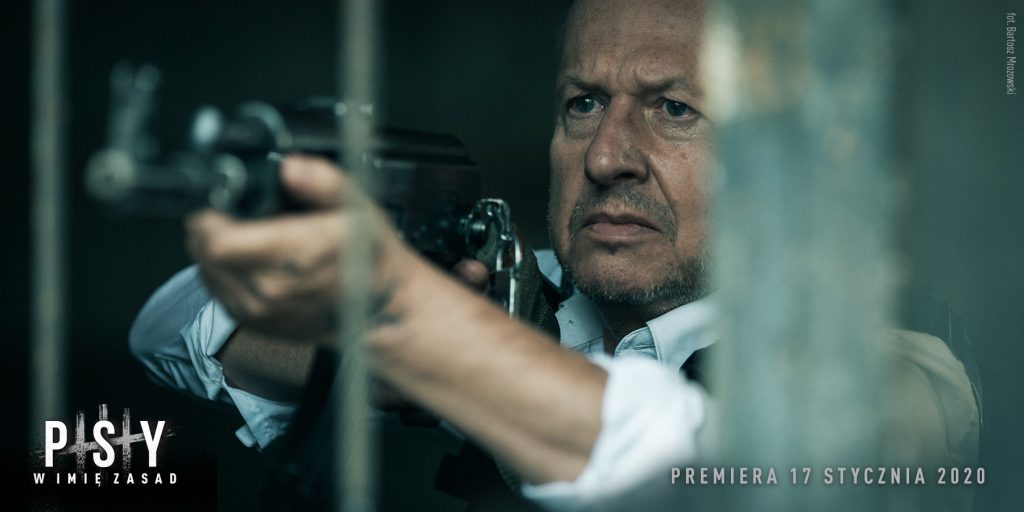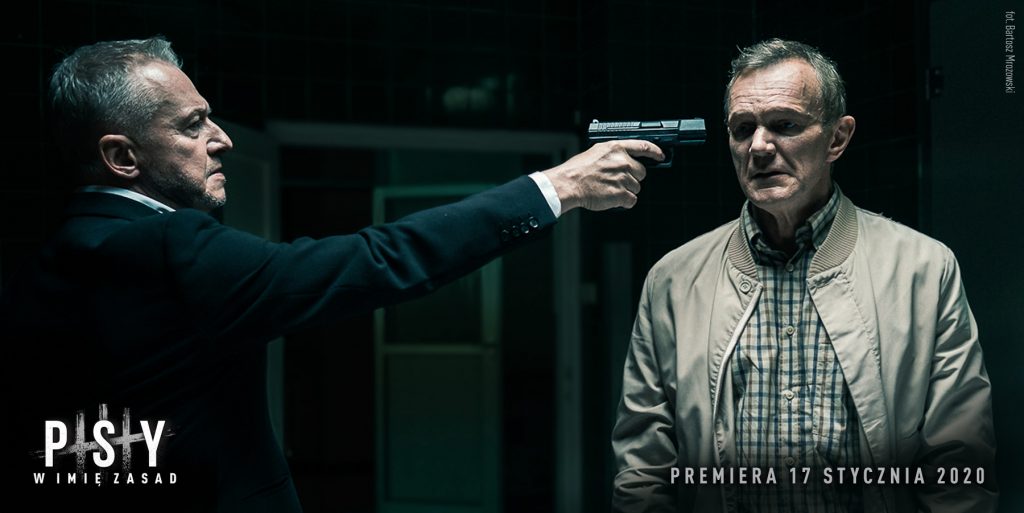If we treated the title of Władysław Pasikowski’s most famous, cult production as something more than just an epithet quite literally describing his heroes (dirty, aggressive SB officers at the threshold of political transformation), one would get the impression that it is also a good suggestion as to the forces controlling the world and people in Dogs. It is worth realizing that in ancient Greece, Cynic philosophers were called dogs (Greek kýon)[1].
Cynic philosophy fits well into the world created by Pasikowski. After all, was there someone more focused on morality among the ancient philosophers than the Cynics? (“In the name of the rules, f…”). For the Cynics, virtue was the only value in an indifferent world. Just as the only thing that was able to touch the hearts of Fanz Maurer and his colleagues was the male, bloody moral code – a sense of honor and the need for revenge taken straight out of classic American gangster movies and westerns[2].

The problem is – what Ewa Mazierska rightly pointed out almost 20 years ago when analyzing Polish post-transformation cinema in the article Pogrążony w kryzysie. Portret mężczyzny w polskim kinie postkomunistycznym in „Kwartalnik Filmowy”[3] – that this moral code and the popularity of Dogs testify something far deeper than just being caught up in the possibilities of commercialism. They are the signs of the negative male patterns pulsing maliciously just under the skin and the sense of existence in the wild new world. In the reality of a ruthless market, which is more likely to overwhelm one with a sense of failure than to enjoy the great success of a free market democracy together with the richest and privileged.
The rules are changing. A man can no longer feel confident, and his pattern of behavior will be radicalized proportionally to the frustration of life in a world without safety and comfort – you have to be tough, you have to be manly, you have to be a macho (“Because she was a bad woman”, but if “you are f… MY woman”, revenge awaits you). The heroes of Dogs perfectly illustrate this male sense of harm. Lack of stabilization leads them straight into a snare of ego filled with distorted honor. But – as usually pointed out when studying economic, socio-cultural and political crises – the crisis can have a positive effect. Unless, of course, it soaks up, it is internalized and subjected to self-reflection and work.
Since Dogs could be analyzed as a mirror of the male world just after Polish political transformation, we can assume that the last part of the series, Dogs 3: In the Name of the Rules, which has just hit the Polish cinemas, will be a portrait of masculinity after more than 30 years from the memorable year of 1989. It is worth to ask yourself about the differences and what actually happened with this masculinity during this time. Have the principles and priorities of our Polish Cynics changed?
Franz Maurer is released after 25 years in prison. He goes out into a completely new world – mobile phones, Warsaw glued with billboards and advertisements, power relations seemingly changed in the criminal and police world, outdated contacts from the past. However, it quickly turns out that the modern world is deceptively similar to that of the past. The distribution of strength looks almost the same as it used to be, and maybe even more brutal (police violence, impunity, sweeping uncomfortable cases under the carpet, disrespect for human life, absolute lack of buddy attachment), only the generation changed. Conflicts are still settled behind the scenes (Maurer directs his first steps to his old contacts, and thus goes to the head of the mafia), the old cases – no longer burdened with heavy portfolios full of political crimes, (these have gone away with smoke – literally) – have expired. In the capitalist jungle, everyone cares for their individual skin.

Though Dogs 3 are devoid of logic – the mafia story in the movie is quickly forgotten and stays unfinished, giving way to the portrait of a corrupt police force and the last battle of “old” masculine honor with a new brutal order. After all, this series was never about steel logic. Dogs were always about a charismatic, hard, male figure. And in the last film of the best-known Polish action cinema director, there are actually only such characters.
Starting from Maurer himself (Bogusław Linda), who is initially supposed to defend himself against the Russian revenge (GRU return), but eventually turns into a triumphant avenger, by “New” (Cezary Pazura), whose motivation is to avenge his family, as well as Commissioner Witkowski (Marcin Dorociński), who is trying to bring order to the police, up to the character who, according to Mazierska’s terminology, could be considered a “new man”, that is Damian (Sebastian Fabijański), a seemingly gentle veteran of the Afghan war who transforms from a docile woodcutter into a sniper and – as it turns out – adheres to the exactly same set of rules as the old crew.
It’s hard to believe that this male, male world hasn’t changed at all during 25 years of Maurer’s time in prison. Women are still deprived of the causative force, and their dialogues and questions are so artificial that viewer’s teeth will hurt. Witkowski and his lover, Ola (Dominika Walo), after one night spent in bed, make plans for a life together (“I want to wake up with you and fall asleep with you”), and the famous Andżela (Magdalena Wojnarowska) from the first movie, who has a small cameo, asks Maurer did he start a family (because what could he do for the last 25 years?).
Were it not for this artificiality of inter-sex relations, one would think that the world of cynics not only has not changed since our last visit, but also became infused with even more misogyny and sexism. However, one can get the impression that a solid load of kitsch, absurdity and embarrassing jokes is a kind of settlement with Pasikowski’s most recognizable work. Unfortunately, all we can count on is safe, distanced irony – no woman will break the harmful pattern of behavior, as if naturally accepting her subjected position.
Harvey Mansfield, an American researcher affiliated to Harvard, promoted the concept of “menaissance”, which, as the name suggests, describes the renaissance of masculinity, which began to develop its wings at the beginning of the new millennium. Dogs 3: in the Name of Rules, like the first part of the series, is a nostalgic film, and in addition this nostalgia has grown to the meta level. It is not longing for the Polish People’s Republic itself, but for nostalgia itself – in those days one could have dreamed of a great return of masculinity, of being macho and of degrading the role of women to a voiceless subject.
I prefer to think that these frolicing of cynic dogs (if we take them
seriously, forgetting the ironic load of the film, by which Pasikowski would
like to erase the traces of the past) are rather a symptom of the recent decline
and dying of this cynical menaissance, rather than a buzzing announcement of its
return. There is some hope though – the fact that most viewers probably will
not take the last part of the Dogs seriously, laughing at kitsch rather than jumping from commitment. One would
like to say that it is high time for femmessance in Polish cinema – would
anyone else like to see famous Andżela gain fullness of her voice, agency and
strength that undoubtedly lies under an artificial submissive coating?
[1] Thank you Miłka for the clue, inspirational conversation and joyful mockery of on-screen misogyny and sexism.
[2] By the way, breaking down the classic American genre cinema into parts allows us to see how violent and masculine-centric genre’s world is – John Wayne did not play nice characters. In fact, although he dealt with bandits and local problems, he did it in a brutal and vindictive way (and this is exactly the path Franz Maurer is walking on) to leave the scene by blurring in the bloody setting sun.
[3] Ewa Mazierska, Pogrążony w kryzysie. Portret mężczyzny w polskim kinie postkomunistycznym, „Kwartalnik Filmowy” 2003, nr 43, [available online]: http://www.akademiapolskiegofilmu.pl/pl/historia-polskiego-filmu/artykuly/pograzony-w-kryzysie-portret-mezczyzny-w-polskim-kinie-postkomunistycznym/27.







Like!! Thank you for publishing this awesome article.
<3!